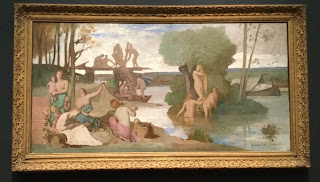Until I return to my summer idyll in July, I will only be posting occasionally, when something "utopic" strikes me. Yesterday I was at the Metropolitan Museum and came across a painter and a work that reminded me of the communal ethos that forms the basis of the utopian ideal. The painter is a Frenchman, Pierre Puvis de Chavannes (1824-1898). There is not much I can say about him now; I have to get used to these paintings. Emile Zola is supposed to have described his work as "an art made of reason, passion, and will." I see the reason part. People who plan utopian communities believe that people will necessarily and rationally work for the greater good. Utopias tend to efface the individual element, and the figures in this artist's work are certainly not recognizable people.
Although many of his paintings suggest an idealized community, the painting that particularly struck me was
The River, the component parts of which portray the communal work and activities of a utopia. It is not surprising that the work of women and that of men are differently conceived, as in the two details below. (Click on images to enlarge.)
And here is the complete canvas.
I particularly liked the reflections in the water of the bathers and of the vegetation.


